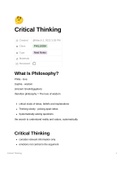Summary
Summary Critical Thinking
- Course
- Institution
Contains a comprehensive summary, illustrations (where applicable) and additional notes/resources related to the topic. Contains notes from: Psychology - An Introduction (Paperback, 4th ed) L. Swartz, C. De la Rey, N. Duncan, L Townsend, V. O'Neill
[Show more]



